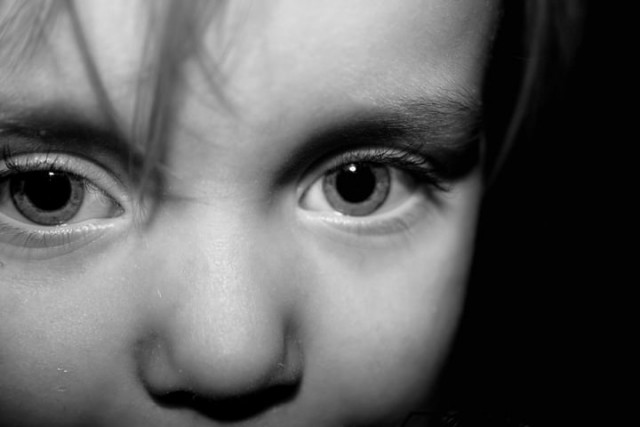Generation(s) lost?: Silent casualties of a decade of war
According to the report, 30-40% people in Karachi suffer from common mental disorders (CMDs).

With limitless avenues for information and bad news blaring on television screens all day, psychiatrists say it is best to discuss security problems with children. PHOTO: CREATIVE COMMONS
There are children in this country who fear gunshots even when there is no firing, who think they can hear bomb blasts when there are no explosions. Amir* is one of those children.
When his father stepped out of his house in Gulberg, Karachi, Amir stopped him. “Baba, bahar na jayain firing ho rahi hai. (translated: Don’t go out, Dad. There is a shooting going on.)” There was no shooting.
At age 2, before he could even construct proper sentences, Amir knew what the word ‘firing’ meant, and the fear attached to it. Going by the exposure to violence in his life, he might soon be able to differentiate between an improvised explosive device (IED), a hand-grenade and a suicide blast.
Amir and other children like him are, arguably, growing up in times of unprecedented violence which has left its scars on every child in some way. As the security situation in Pakistan remains volatile and quietly erodes millions of minds, doctors say it is necessary to recognise today’s mental health needs.

“In any act of terror, there is always someone helping. We need to tell our children about the charity workers, the blood donors and the neighbours who help each other in the time of need.... There is always the good,” says Dr Tania Nadeem, assistant professor at the Aga Khan University (AKU) Department of Psychiatry.
With limitless avenues for information and bad news blaring on television screens all day, psychiatrists say it is best to discuss security problems with children.
“Parents should ask their child what they know, and then discuss it with them. It’s important not to give too much information and only explain as much as a child wants or needs to know,” she says.
“Security conditions are tough in the country but you have to find space for yourself, get involved in activities and find a way to keep going,” says Dr Tania Nadeem, adding that one should not be over-protective.
“If you are over-protective, and perpetually anxious about your child, they might grow up with anxiety problems,” she cautions.
There are no formal studies in Pakistan on the number of children suffering from mental illness so it is difficult to determine the exact prevalence of psychological conditions in minors. But the number of people, both adults and children, seeking psychiatric help are increasing every year as people become more aware and life in Pakistan more complex.
Dr Murad Moosa Khan, who heads the psychiatry unit at the AKU, says there is a 10% to 15% increase in patients coming to the hospital every year.
“Mental health cannot be detached from wider societal conditions; when law and order breaks down, it affects each one of us,” he says.
“For example, when a call is made for a city to be shut down, the mental health implications of such a statement are immense. At that time, what goes through the mind of someone who is a daily wage earner or the parents of a student who has an exam the next day or a mother who is due to deliver a baby has immeasurable adverse implications.”
Post-traumatic stress
In a country where millions of people have witnessed military operations, and have lived or are living through insurgencies and displacements, there are no studies on the effect of exposure to violence or symptoms of post-traumatic stress disorder (PTSD).
However, a mental health report on Karachi quotes a study on complicated grief (a syndrome comprised of symptoms of separation distress) and traumatic distress (for instance, the feeling of numbness, disbelief, anger, mistrust, insecurity) amongst 151 out-patient psychiatric patients in Karachi. All had survived the death of a close relative or friend in the past year. In 48% of the cases, the cause of death was ‘acts of violence’.
Common mental disorders
Pakistan has one of the highest rates of common mental disorders (CMDs) in the developing world. These include states of mild to moderate depression and anxiety. According to the report, 30-40% people in Karachi suffer from CMDs. Countrywide, it is estimated that 15-20% of the adult population, or 20 million people, suffer from depression.
If these figures are to decrease, these disorders need to be recognised as a public health problem, which is any condition that affects a significant proportion of the population. Public health approach to addressing any problem includes health promotion and disease prevention. Even if mental health makes it to some government priority list today, the imprints of violence will take decades to fade out. But at present, even a mental health policy and separate budget is a far cry in a country where doctors believe at most 1% of the total health budget is spent on mental illness. The battle for stability may have been lost even before it’s been fought.
*Name has been changed.
Published in The Express Tribune, September 24th, 2013.



















COMMENTS
Comments are moderated and generally will be posted if they are on-topic and not abusive.
For more information, please see our Comments FAQ